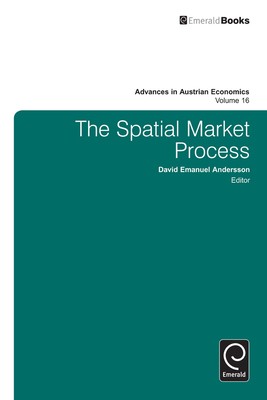
- We will send in 10–14 business days.
- Publisher: Emerald Group Publishing
- ISBN-10: 178190006X
- ISBN-13: 9781781900062
- Format: 15.6 x 23.4 x 2.1 cm, hardcover
- Language: English
- SAVE -10% with code: EXTRA
The Spatial Market Process (e-book) (used book) | bookbook.eu
Reviews
Description
Key features of Austrian economic theory are the use of methodological individualism, the view that entrepreneurs cause development, and the recognition that local knowledge is largely tacit and thus difficult to communicate. The contributors to The Spatial Market Process show how these and other Austrian features provide an alternative foundation for understanding the spatial manifestation of economic phenomena. Many chapters elaborate upon theoretical insights first formulated by F.A. Hayek. The work of urban theorist Jane Jacobs, the entrepreneurship theories of both Joseph Schumpeter and Israel Kirzner, transaction costs in the Coasean tradition, and Fritz Machlup's notion of "knowledge conveyors" are examples of other theoretical constructs that are integrated into new spatial theories by the contributors; combining classical Austrian theories with contemporary breakthroughs.
EXTRA 10 % discount with code: EXTRA
The promotion ends in 16d.05:35:04
The discount code is valid when purchasing from 10 €. Discounts do not stack.
- Publisher: Emerald Group Publishing
- ISBN-10: 178190006X
- ISBN-13: 9781781900062
- Format: 15.6 x 23.4 x 2.1 cm, hardcover
- Language: English English
Key features of Austrian economic theory are the use of methodological individualism, the view that entrepreneurs cause development, and the recognition that local knowledge is largely tacit and thus difficult to communicate. The contributors to The Spatial Market Process show how these and other Austrian features provide an alternative foundation for understanding the spatial manifestation of economic phenomena. Many chapters elaborate upon theoretical insights first formulated by F.A. Hayek. The work of urban theorist Jane Jacobs, the entrepreneurship theories of both Joseph Schumpeter and Israel Kirzner, transaction costs in the Coasean tradition, and Fritz Machlup's notion of "knowledge conveyors" are examples of other theoretical constructs that are integrated into new spatial theories by the contributors; combining classical Austrian theories with contemporary breakthroughs.


Reviews